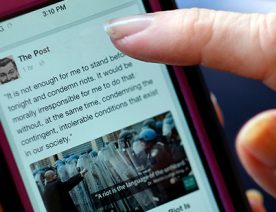
As the news industry searches for new revenue models to finance journalism online, a new research study suggests that some sorts of digital advertising are demonstrably more effective with users than others.
Contrary to what some might expect, new styles of ads designed for mobile screens show signs of being more useful than older forms of digital advertising.
Ads that people see as they scroll through a story—known as scroll ads, a newer form of advertising developed for mobile screens—appear to be more effective on a range of metrics than older ad types such as pop-up ads and static banner ads, according to new research by the Media Insight Project, a collaboration between the American Press Institute and The Associated Press-NORC Center for Public Affairs Research.
People are more likely to say they trust the article they read when scroll ads are present and to notice scroll ads compared to static ads. And they are more likely to recall which product was advertised in a scroll ad than they are in pop-up ad.
The findings are potentially important for publishers as audiences move further toward mobile technology as the primary means for interacting with digital content.
In the first decade of the web—largely a desktop and laptop environment—advertising was migrated from print onto digital screens. Banner and pop-up ads were the primary formats for digital advertising. But engagement with these types of advertising has proven problematic over time, and, as users have moved to mobile devices with smaller screens, advertising messages that block part of the screen have posed complications, from slower load times to the rise of ad blocking.
This new research suggests that advertising formats designed more recently, and with mobile in mind, can be less intrusive. Compared with ad formats designed for other web environments, they can also improve recall of the product being advertised and enhance trust in the article where the ad appears.
The survey experiment was conducted November 9 through December 6, 2016, using the AmeriSpeak®, the probability-based panel of NORC at the University of Chicago. All interviews were conducted online with 1,489 American adults.




